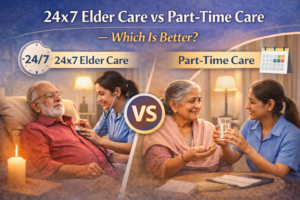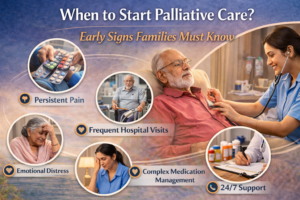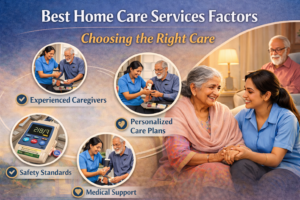Early Palliative Care: Improve Quality of Life, Not Just End-of-Life
Understanding the True Role of Early Palliative Care
Palliative care is often misunderstood as something that only comes into play during the final stages of life. However, early palliative care is a proactive approach that focuses on improving a patient’s quality of life from the time of diagnosis of a serious illness, not just at the end. Whether the condition is cancer, heart disease, kidney failure, or neurological disorders, this holistic care model is designed to alleviate suffering and support patients and families throughout the journey.
In fact, studies have shown that introducing palliative treatment early in treatment significantly improves both physical and emotional outcomes. According to the World Health Organization, about 40 million people need palliative care each year, yet only about 14% of them receive it. The time to change that is now.
Why Quality of Life in Palliative Care Begins Early
The core mission of quality of life in palliative care is to help individuals live well despite having a serious health condition. Initiating palliative treatment early ensures patients can:
- Maintain dignity and comfort throughout treatment
- Better manage complex symptoms such as pain, nausea, fatigue, or breathlessness
- Receive emotional and psychological support through therapy and counseling
- Preserve independence and active participation in life activities
According to a study published in The New England Journal of Medicine, patients with advanced lung cancer who received early palliative treatment lived longer and reported higher quality of life than those who received standard care alone.
Pain and Symptom Management: More Than Just Medication
One of the primary goals of early treatment is pain and symptom management. It includes personalized interventions to relieve:
- Chronic pain
- Shortness of breath
- Nausea and vomiting
- Anxiety or depression
- Sleep disturbances
Palliative treatment teams consist of doctors, nurses, and other specialists who create tailored plans based on the patient’s condition and lifestyle. These plans are updated regularly, allowing for responsive care at every stage.
Long-Term Palliative Care: A Continuous Journey
Long-term palliative treatment focuses on individuals dealing with illnesses that persist over many months or years. Conditions like dementia, advanced heart failure, and COPD require sustained support that adapts as needs evolve.
- Preventing unnecessary hospital visits
- Reducing caregiver burnout
- Promoting stability and comfort at home
- Helping patients align medical treatment with personal values
This extended care not only improves the quality of life but also helps patients maintain autonomy and purpose throughout the course of their illness.
Family Support in Palliative Care: Caring for the Caregivers
Family support in palliative treatment is integral. Families receive:
- Counseling and emotional support
- Training in caregiving tasks
- Assistance with navigating healthcare systems
- Respite care services to prevent burnout
Supporting the family strengthens the overall care environment and leads to better outcomes for everyone involved.
Palliative Care Services in Kolkata: Making Quality Care Accessible
Cities like Kolkata are making strides in expanding access to palliative treatment. Various palliative care services in Kolkata are now offering:
- Home-based care for bedridden patients
- Hospital palliative treatment units integrated with oncology and other departments
- Community-based outreach programs supported by NGOs and charitable hospitals
As highlighted in a recent Hindu article, the shift toward recognizing palliative treatment as an essential part of healthcare is growing, especially in urban India where chronic illness burdens are high.
Common Myths About Early Palliative Care

When Should You Consider Early Palliative Care?
You don’t need to wait until curative treatment ends to start palliative treatment. Consider it if:
- You or your loved one is diagnosed with a life-limiting or chronic illness
- Pain or symptoms are affecting daily life
- There’s emotional or psychological distress related to the illness
- You need guidance making complex treatment decisions
The Path Forward: Empowering Life with Early Palliative Care
Instead of waiting until all other options are exhausted, introducing early palliative treatment empowers individuals to navigate their journey with dignity, comfort, and control. It’s a model that aligns medical support with human values, benefiting both patients and families alike.
In cities like Kolkata, where the healthcare system is expanding, the growth of palliative care services offers a hopeful outlook for those facing serious illnesses. With rising awareness, early integration can shift the perception of palliative treatment from a final resort to a life-affirming choice.
FAQs
- Q1. What is the difference between early palliative treatment and hospice treatment?
A: Early palliative treatment can begin at diagnosis and works alongside treatment, while hospice is usually reserved for end-of-life care. - Q2. Can palliative treatment be provided at home?
A: Yes, many palliative treatment services in Kolkata and other cities offer home-based care for comfort and convenience. - Q3. Does starting palliative treatment mean stopping other treatments?
A: No, palliative treatment complements curative treatments and enhances quality of life throughout. - Q4. Who provides palliative treatment?
A: A multidisciplinary team including doctors, nurses, social workers, therapists, and spiritual care providers. - Q5. Is palliative treatment only for cancer patients?
A: No, it supports patients with a wide range of chronic and life-limiting illnesses like heart failure, kidney disease, and neurological conditions.








